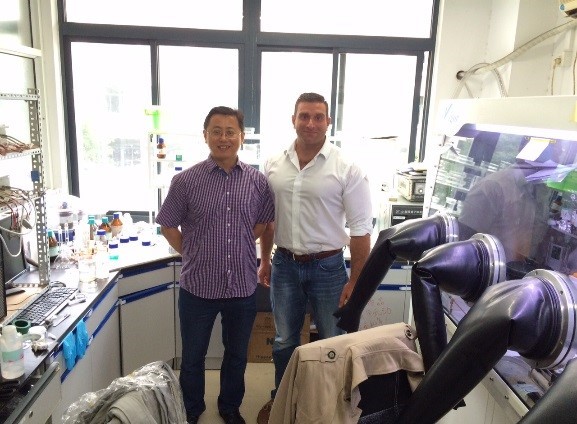
On his first research trip abroad, Ph.D. candidate Giovanni DeLuca learned to expect the unexpected
What happens when you’re a Ph. D. candidate who travels abroad on a National Science Foundation grant for eight weeks of research, only to find that the lab you’re assigned to isn’t what you expected?
If you’re Giovanni DeLuca, of the School of Chemistry and Biochemistry, you adopt a seven-days-a-week work schedule, join other research groups for their projects, get a paper published, and initiate previously impossible experiments back home. “From day one, I knew I had to put in maximum effort if I was going to accomplish anything,” says DeLuca of his 2016 summer research at Donghua University in Shanghai, China.
DeLuca develops photovoltaic (PV) cells – devices that convert sunlight into electricity. The PV cells he works with use thin layers of a material called perovskite. Perovskite is considerably cheaper than silicon and other materials typically used in PV cells, making it a promising option for widespread use of PV cells.
Perovskite, however, requires specific environmental conditions to perform optimally. Summers in Shanghai are hot and humid, hence DeLuca’s dilemma. “I'm used to working in air-conditioned, moisture-controlled labs,” DeLuca says. The Shanghai labs were not.
“It caught me completely off guard,” DeLuca says. “The perovskite active layer is extremely sensitive to temperature and moisture, making exposure to the ambient summer conditions a serious problem.”
To overcome this unexpected obstacle, DeLuca simply turned summer lemons into perovskite lemonade.
“I was able to work with another Ph. D. candidate from China to develop a technique to fine-tune the morphology of the perovskite active layer. This allowed us to fabricate devices in ambient conditions,” DeLuca explains. Their success led to a perovskite PV device that achieved 16% efficiency under ambient conditions. Similar devices prepared under normal lab conditions typically achieve efficiencies in the single digits. According to DeLuca, the world record for perovskite PV device efficiency is 22%.
The group DeLuca worked with wrote and submitted two papers for publication. Such was the wealth of new information gained from their hard work. One paper has already been published in the journal Solar Energy Materials and Solar Cells.
In addition to improving perovskite layers, DeLuca was also able to fabricate a supercapacitor, which can store the energy collected by perovskite PV solar cells. “I was unfamiliar with fabrication of supercapacitors, so learning this skill was an especially useful experience,” DeLuca says. He hopes to return to China for up to a year and work on combining both PV solar cells and supercapacitors into a single collection-storage device.
DeLuca’s work in China indicated that it was unnecessary to analyze the performance of perovskite devices under strict climate controls. Upon returning to Georgia Tech, DeLuca helped open other research possibilities with perovskite.
DeLuca began pursuing a Ph.D. in chemistry after graduating with degrees in physics and chemistry from the University of West Florida and a research stint at Pall Corporation, a filtration and separation company. He is co-advised by Elsa Reichmanis, professor in the School of Chemical and Biomolecular Engineering, and Angus Wilkinson, professor in the School of Chemistry and Biochemistry. DeLuca recently developed research collaborations between the School of Electrical and Computer Engineering and scientists at Monash University in Melbourne, in Australia, on novel solar cell technology. DeLuca will travel there during the summer of 2017 to work on research goals involving the development of solar cells with higher efficiency.
The National Science Foundation EAPSI (East Asia Pacific Summer Institute) grant that funded Deluca’s trip to China will also fund his trip to Australia. It is awarded annually to U.S. graduate students pursuing a degree in science, engineering, or education. It supports and fosters research collaboration between universities in the U.S. and those in East Asia and throughout the Pacific. DeLuca appreciates the opportunity to travel abroad and work with other groups. “It provides me with an opportunity to gain an international perspective on this topic,” he says.
“I learned quite a bit from my time in China, but I'd have to say preparedness was a lesson I was learning over and over again,” DeLuca remarks. “I think I will be obsessive-compulsive about expecting the unexpected when travelling from now on.”
Matt Barr
Science Communications Intern
College of Sciences